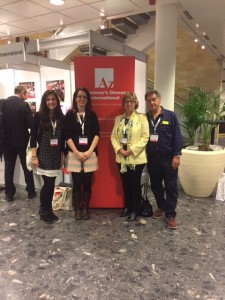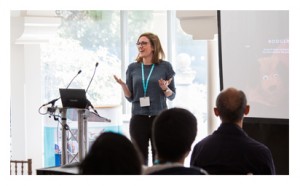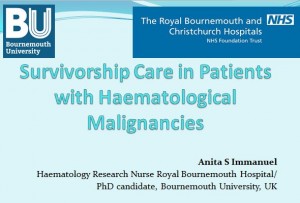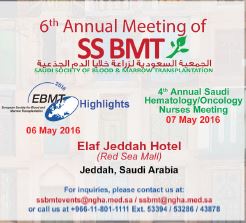
Robotics & Autonomous Systems – US leads robotics investment boom

Latest research and knowledge exchange news at Bournemouth University

Mary O’Malley and Dr. Michelle Heward represented Bournemouth University Dementia Institute (BUDI) at the 31st Alzheimer’s Disease International Conference in Budapest from 21-24th April 2016.
Mary presented a poster showcasing her PhD research ‘Alzheimer’s disease International (ADI) – “You can get completely disorientated and reason is because all the corridors look the same” – a qualitative study into the orientation experiences and design preferences of older people with memory difficulties living in retirement complexes’. Michelle presented a paper on ‘Fire safety in the home: local lessons – global reach’ as part of a session on dementia friendly communities.
This years conference theme was ‘Dementia: Global Perspective, Local solutions’, with a strong local, national and international presence creating unique synergies and inspiring new ideas in the pursuit of making a difference in the lives of those living with dementia.

Whilst at the conference Mary and Michelle caught up with Hilary and Peter Paniccia, from Somerset, who have previously participated in several BUDI projects. Hilary lives with dementia, and is supported by her husband Peter (who is now chief photographer at many national and international dementia events). They have become real advocates of dementia awareness and are both actively involved in numerous groups and projects, including the European Working Group of People with Dementia. They really bring to life the phrase ‘living well with dementia’ – a true inspiration to us all. You can see Hilary and Peter speaking about how they live well with dementia in our ‘living well with dementia’ video: https://www.youtube.com/watch?v=qWUZFiy2Qy8.
Mary O’Malley and Michelle Heward
 We would like to invite you to the latest research seminar of the Creative Technology Research Centre.
We would like to invite you to the latest research seminar of the Creative Technology Research Centre.
Title: Critical Review of Vendor Lock-In and Its Impact on Adoption of Cloud Computing
Speaker: Justice Opara-Martins (Bournemouth University PhD student)
Time: 2:00PM-3:00PM
Date: Wednesday 11th May 2016
Room: P302 LT, Poole House, Talbot Campus
Abstract:
Vendor lock-in is a major barrier to the adoption of cloud computing, due to the lack of standardization. Current solutions and efforts tackling the vendor lock-in problem are predominantly technology-oriented. Limited studies exist to analyse and highlight the complexity of vendor lock-in problem in the cloud environment. Consequently, most customers are unaware of proprietary standards which inhibit interoperability and portability of applications when taking services from vendors. In this seminar, I will provide a critical analysis of the vendor lock-in problem, from a business perspective. A survey based on qualitative and quantitative approaches conducted in this study has identified the main risk factors that give rise to lock-in situations. The survey analysis of 114 UK IT practitioners shows that, as computing resources migrate from on-premise to the cloud, the vendor lock-in problem is exacerbated. Furthermore, the findings exemplify the importance of interoperability, portability and standards in cloud computing. A number of strategies are proposed on how to avoid and mitigate lock-in risks when migrating to cloud computing. The strategies relate to contracts, selection of vendors that support standardised formats and protocols regarding standard data structures and APIs, developing awareness of commonalities and dependencies among cloud-based solutions. We strongly believe that the implementation of these strategies has a great potential to reduce the risks of vendor lock-in.
We hope to see you there.

Are you looking for academic writing tips?
Then come to the Writing Academy lunchbyte session on 18th May 2016, 12noon to 1.30pm.
Edwin van Teijlingen, Professor of Reproductive Health Research at the Centre for Midwifery, Maternal & Perinatal Health, Bournemouth University, will lead this lunchtime session for budding academic writers.
With over 220 peer-reviewed publications Prof. Edwin van Teijlingen has published widely in the field of public health, social sciences and the organisation of health care systems. He is Associate Editor of BMC Pregnancy & Childbirth as well as Book Review Editor for Sociological Research Online. Furthermore, he is on the editorial boards of various international journals including: Birth, Nepal Journal of Epidemiology, and Midwifery. Together with academic colleagues at BU he has written several articles about different aspects of academic writing. [1-7]
In this workshop, Edwin will share his extensive writing experience with you and you will also have the opportunity to network with colleagues and have a chat with Edwin during lunch.
Please see this link for more information – https://staffintranet.bournemouth.ac.uk/workingatbu/staffdevelopmentandengagement/fusiondevelopment/fusionprogrammesandevents/writingacademy/gettingpublished/
To book a place on this session (so that catering can be booked), please email Organisational Development.
Students from the Centre for Digital Entertainment (CDE) took part in a two-day Research Jam to put their skills to the test to create apps or games with the purpose of enhancing the work of Bournemouth University Dementia Institute (BUDI).
The Centre for Digital Entertainment is a centre for doctoral training and collaboration between the universities of Bournemouth and Bath, funded by the Engineering and Physical Sciences Research Council (EPSRC).
The intention of this year’s CDE annual event, also attended by academics and industry professionals, was to bring the focus back to the skills and knowledge the CDE Research Engineers are gaining during the four year programme, and inputting it into a creative process that could benefit society.
 Professor Jian Jun Zhang, Deputy Director of CDE at Bournemouth University, said, “This year we wanted to push our students a little harder and by using their expertise and teaming up with BUDI, we hope to have a societal impact through the work we are doing”.
Professor Jian Jun Zhang, Deputy Director of CDE at Bournemouth University, said, “This year we wanted to push our students a little harder and by using their expertise and teaming up with BUDI, we hope to have a societal impact through the work we are doing”.
The two day event, which took place in the beautiful Italian Villa, included a talk from the BBC’s Research and Development department and Dementia Friends training from BUDI, before students were split into groups and each asked to create an app, game or interface that would either raise awareness for, or assist people with dementia.
An integral part of the programme is the three year industrial placement. Ian Stephenson, a Senior Lecturer in Computer Animation and part of the CDE, said, “These postgraduate students have been working in companies like the BBC and Double Negative, once a year we bring them together. This year we have partnered with BUDI to look at the topic of dementia. We want these young engineers to build something that addresses the issue of dementia in society – to put their technical skills to use for the benefit of society.”
The event started with presentations from the BBC’s Research and Development (R&D) department and Bournemouth-based company 3 Sided Cube, giving the students an insight into work processes around digital content creation before the teams got to work. After seeing the presentations and collating information, the teams had a little under 24 hours to research, create and present their ideas.
The teams were asked to work on one of three main areas within the theme of dementia; physical stimulation to keep people with dementia active; social stimulation to increase interaction, and generational interaction, for people with dementia; or a piece of technology to challenge public view of dementia.
 Becky Gregory-Clarke (pictured) from the BBC’s R&D team said, “The BBC R&D team has a strong link with the CDE through student placements and we’ve been ‘workshopping’ around the idea of dementia too, so it was great to come along and see these students at work. It’s really great for students to get involved in events like this because at the BBC we do things like this as a part of our work day too, so if you can get used to brainstorming and working like this now it can really hold you in good stead for your career in the future too.”
Becky Gregory-Clarke (pictured) from the BBC’s R&D team said, “The BBC R&D team has a strong link with the CDE through student placements and we’ve been ‘workshopping’ around the idea of dementia too, so it was great to come along and see these students at work. It’s really great for students to get involved in events like this because at the BBC we do things like this as a part of our work day too, so if you can get used to brainstorming and working like this now it can really hold you in good stead for your career in the future too.”
BU is hosting an Interdisciplinary Research HE Sector Day on 21st June 2016, dedicated to exploring the benefits and challenges of interdisciplinary research.
Presentations include:
Key Note Address – Dr. Louise Mansfield (What Works Centre for Wellbeing / Brunel University London)
The Funders’ Perspective – Charlotte Lester (HEFCE), Dan Licari (Innovate UK / KTN Creative, Digital & Design) and Ben Sharman (UK National Contact Point – Inclusive, innovative and reflective societies)
Supporting Interdisciplinary Working – Prof. Alan Lester and Debbie Foy-Everett (Sussex), Luke George (Research Professional) and Christopher Ferguson (Piirus)
Research Professional and Piirus
The Academics’ Perspective – Prof. Adele Ladkin (BU), Dr. David Hutchinson (Portsmouth) and Dr. Justine McConnell (TORCH, University of Oxford)
Facilitated networking session – How can I contribute?
The event will take place in BU’s Executive Business Centre.
Please see the Event webpage for the full programme and speakers’ biographies. Key to the programme, as well as inspirational speakers, there will be plenty of time to network with colleagues and participate in exploring your own relationship with interdisciplinary research.
This event is free and open to academics and research support staff throughout the UK.
Places are limited, so book now via Eventbrite.

The Royal Academy of Engineering invites applications for its launchpad competition. Funding aims to encourage young entrepreneurs to start a new business based on their innovation in engineering or technology, with engineering defined in its broadest sense. The competition aims to:
•improve the skills of the awardee:
•develop role models of entrepreneurship;
•bring engineering innovations to market for a wider public benefit.
Applications are open to individuals or small teams. The lead applicant must be UK-based and aged between 16 and 25. They should have a viable and commercial business proposition with a large market opportunity, and be planning to set up a business within the 18 months following the application deadline. The feasibility of the initial product or service must have been proven preferably with a basic prototype.
The winner receives the JG Gammon award, which includes a cash prize of £15,000 and a year’s membership of the enterprise hub. This provides mentoring, training and networking opportunities with UK entrepreneurs and investors. Up to two other individuals or teams may be chosen as runners up.
Click here for more information on support for entrepreneurs.
Click here for more information on the launchpad competition – now live !
 BU PhD student Anita Immanuel has been invited to speak at the 4th Annual Saudi Hematology/Oncology Nurses Meeting in Jeddah, Saudi Arabia this Saturday (May 7th). Anita’s Ph.D. study examines the quality of lives of adults who have survived cancer of the blood or lymphatic system. Patients with haematological cancers have frequently reported lack of care-coordination as an unmet need following their intensive treatment. With the increase in the number of cancer survivors and possible long-term side effects that could impact on the quality of life, it is important to have (a) good post-treatment follow up; and (b) seamless coordination between health care providers.
BU PhD student Anita Immanuel has been invited to speak at the 4th Annual Saudi Hematology/Oncology Nurses Meeting in Jeddah, Saudi Arabia this Saturday (May 7th). Anita’s Ph.D. study examines the quality of lives of adults who have survived cancer of the blood or lymphatic system. Patients with haematological cancers have frequently reported lack of care-coordination as an unmet need following their intensive treatment. With the increase in the number of cancer survivors and possible long-term side effects that could impact on the quality of life, it is important to have (a) good post-treatment follow up; and (b) seamless coordination between health care providers.
 Dr. Helen McCarthy (The Royal Bournemouth and Christchurch Hospitals NHS Foundation Trust), Anita’s clinical Ph.D. supervisor at congratulated her on this invitation. Dr. McCarthy said: “This talk in Saudi Arabia gives Anita the opportunity to present some of her preliminary Ph.D. findings.”
Dr. Helen McCarthy (The Royal Bournemouth and Christchurch Hospitals NHS Foundation Trust), Anita’s clinical Ph.D. supervisor at congratulated her on this invitation. Dr. McCarthy said: “This talk in Saudi Arabia gives Anita the opportunity to present some of her preliminary Ph.D. findings.”
FHSS’s Dr. Jane Hunt commented: “Anita’s research is addressing a growing issue with more people living longer with cancer. Her Ph.D. identifies key quality of life issues and helps us to understand the needs surrounding survivorship care better.”
Prof. Edwin van Teijlingen
CMMPH

Today, an increasing number of funding agencies, journals, and other stakeholders are requiring data producers to share, archive, and plan for the management of their data. In order to respond to these requirements, researchers and information professionals will need the data management and curation knowledge and skills that support the long-term preservation, access, and reuse of data. Effectively managing data can also help optimize research outputs, increase the impact of research, and support open scientific inquiry.
The Curating Research Assets and Data Using Lifecycle Education (CRADLE) Project in collaboration with EDINA at the University of Edinburgh have developed an online course which will provide learners with an introduction to research data management and sharing. After completing this course, learners will understand the diversity of data and their management needs across the research data lifecycle, be able to identify the components of good data management plans, and be familiar with best practices for working with data including the organization, documentation, and storage and security of data. Learners will also understand the impetus and importance of archiving and sharing data as well as how to assess the trustworthiness of repositories. .
After completing this course, learners will also be better equipped to manage data throughout the entire research data lifecycle from project planning to the end of the project when data ideally are shared and made available within a trustworthy repository.
The course material is free to access and if you wish to complete the course with a certificate, there is a charge of £34.
Please click on this link to find out more – https://www.coursera.org/learn/data-management/.

The following funding opportunities have been announced. Please follow the links for more information.
British Council
The British Council have announced the opening of a number of Newton funded grants.
The Newton Institutional Links grant aims to build innovative collaborations directly relevant to social welfare and economic development between the UK and any of the following countries: Brazil, Egypt, Indonesia, Kazakhstan, Philippines, Thailand and Mexico. Grants are available for amounts between £50k-£300k. Closing Date 27/6/16 at 16:00
The Newton Researcher Links Travel Grants has made available funds for international research placements (for 1-6 months, dependent on the country) for researchers that reside in the UK with partners in Colombia, Egypt, Indonesia and Turkey or those from the partner countries to visit the UK. guidance may be found here. Closing Date 27/6/16 at 16:00
The Newton Workshop Grants fund aims to bring early-career researchers together with a partner country (Brazil, Egypt, India, Turkey, South Africa and Vietnam. Mexico may also be added to this fund in the future.) to address problems of low-income and vulnerable populations. The level of the grant funding available depends on the specific partner country. More guidance may be found here. Closing Date 27/6/16 at 16:00
Economic and Social Research Council
The ESRC, together with DFID, welcome applications to the Raising Learning Outcomes in Education Systems Research Programme. The topic for 2016 relates to ‘how do accountability relationships and processes within developing country education systems enable or inhibit the raising of learning outcomes?’ A total of £6.5M will be made available with projects expected to be between £200k-£700k. Closing Date 26/7/16 at 16:00
European Commission
The Directorate-General for Mobility and Transport have announced a tender opportunity to apply for a “Study on the implementation of Directive 2006/126/EC of the European Parliament and of the Council of 20.12.2006 on driving licences“. Applications are welcome for amounts up to €200k to provide analysis for the project which can last a maximum 12 months. Closing Date 7/6/16
The Directorate-General for Employment, Social Affairs and Inclusion has opened a call for proposals which offer “Support for Social Dialogue“. A total fund of €9.3M is available with expected grants to be between €150k-€500k. Closing Date 30/6/16
The European Food Safety Authority (EFSA) welcomes applications for the provision of services in relation to research on “Italy-Parma: Wildlife: collecting and sharing data on wildlife populations, transmitting animal disease agents“. The maximum amount to be tendered for is €3m for a study lasting no more than 72 months. Closing Date 13/6/16
As part of H2020, 27 calls related to Bio-Based Industries (H2020-BBI-JTI-2016) have opened. An overall budget of €188.6M will be available with a minimum amount of €110M to be awarded. Closing Date 8/9/16
Wellcome Trust
Applications are invited for an Early Career Fellowships who wish undertake research in a laboratory in India. Fellowships are for up to five years and will cover personal support for the fellow, research and travel expenses. Closing Date 6/6/16
The Seed Awards in Science scheme provides one-off grants of up to £100k for projects lasting up to two years. Funds cannot be used to pay for personal salary costs but are intended to pay for research and travel costs. Closing Date 20/6/16
The Collaborative Awards in Humanities and Social Science invites applications for projects proposing to conduct research into major health-related questions in the humanities and social sciences. Awards cannot exceed £2M but are expected to be in the range of £1M to £1.5M. Preliminary Application Closing Date 8/7/16
The Collaborative Awards in Science makes available an award of up to £4M over five years for interdisciplinary research collaborations of scientists and/or clinicians (medical and veterinary) and/or non-biologists (e.g. mathematicians, physicists, chemists, engineers and social scientists). Preliminary Application Closing Date 22/8/16
If you are interested in submitting to any of the above calls you must contact RKEO with adequate notice before the deadline.
Please note that some funding bodies specify a time for submission as well as a date. Please confirm this with your RKEO Funding Development Officer.
You can set up your own personalised alerts on Research Professional. If you need help setting these up, just ask your School’s/Faculty’s Funding Development Officer in RKEO or view the recent blog post here.
If thinking of applying, why not add notification of your interest on Research Professional’s record of the bid so that BU colleagues can see your intention to bid and contact you to collaborate.

Dr Lee-Ann Fenge
Over the past few years there have been a number of reports which have highlighted concerns about failures of care and patient safety within a range of NHS settings raising serious concerns about the leadership of such organisations. Most recently The Care Quality Commission has identified “serious concerns” about the safety of mental health and learning disability patients at Southern Health NHS Trust. The concerns highlight the failures of leaders to deliver, monitor, assure, and safeguard a culture of safety, quality, and compassionate care and services.
So what leadership challenges are there in turning this situation around? Undoubtedly there have already been improvements in the care offered within the Trust, and the commitment of staff to provide high quality care is beyond doubt. However, the problems result from on-going senior leadership failures within the organisation. Leadership is the most influential factor in shaping organisational culture (Faculty for Medical Leadership and Management, 2015), and is essential to ensure high quality, safe and compassionate healthcare. A key failing identified in Southern Healthcare concerns a lack of robust governance arrangements to investigate incidents, resulting in a lost opportunity to learn from these incidents.
This highlights the importance of senior leadership in establishing and maintaining a culture which is open, responsive and able to learn. Such a culture includes a climate in which communication is valued as a two process which values critical upward communication. This requires a culture of ‘voice’ in which concerns raised by patients, carers and staff are listened to and responded to appropriately. This was sadly lacking at Southern Health and action was not taken to address known risks to the safety of patients, including a lack of response to previous concerns highlighted by the CQC in January 2014, October 2014 and August 2015.
The Trust also failed to respond appropriately to staff concerns about their abilities to discharge certain roles and duties. This perhaps illustrates the failure of senior managers to create a culture of ‘psychological safety’ for staff in which to identify, respond and learn from these problems. Psychological safety has been shown to be a crucial element in organizational efforts to detect and prevent problems (Edmondson et al. 2016). A culture which provides psychological safety for staff embraces ‘challenge’ as a pivotal learning mechanism, and this is supported by the work of McSherry and Pearce (2016) who suggest that safe, quality care requires leaders who can challenge and be challenged.
It is important to learn from the failings of Southern Health. Increasingly NHS leaders need to be able to respond to growing complexity across integrated systems of care. They need the ability to support a system of communication which values the ‘voice’ of all stakeholders to create innovative solutions to 21st century challenges. This requires system leadership that works in partnership across organisations ‘to construct the services that are needed’ (HSJ, 2015:4). It also requires a commitment to create a shared vision of care which values the voice and presence of patients, carers and staff as key stakeholders.
References
McSherry, R.and Pearce, P. (2016) ‘What are the effective ways to translate clinical leadership into healthcare quality improvement?’ Journal of Healthcare Leadership; 2016 (8): 11-17
Are you interested in scandal?
Most people are. And while scandal of one sort or another has long been a major part of our media diet, in recent years institutional scandals involving corporate immorality, incompetence or cover-up have assumed an increasingly prominent place, involving the banks and other commercial corporations, the churches, police forces, the media, and Parliament, amongst others. If you wonder what this tells us about contemporary society, and how we should respond to it, come to a public event at the Executive Business Centre on Wednesday 11 May at 5pm (refreshments available before the start).
In this open meeting, leading criminologist Professor Chris Greer (City University) and Lord Blair (Sir Ian Blair, former Commissioner of the Met) will discuss key issues including how the British state is responding to scandal proliferation, the implications of scandal for crime control and institutional regulation in the digital age, and the risk of scapegoating as a substitute for understanding and solving, particularly in a 24/7 news environment. Professor Ann Brooks will chair.
For more information, and to book for this free event please visit the Eventbrite booking page.
This is the second in a series of high profile public events at BU, called Dialogues in the Social Sciences. Organised by Professors Ann Brooks, Candida Yates and Barry Richards, their aim is to bring insights from the social sciences to bear on major areas of current concern: higher education, crime and scandal, and violent extremism.

The aim of this Ufi Charitable Trust investment programme is to offer early-stage funding of up to £50k to organisations that are looking to develop new services or improve access to and delivery of adult learning through the imaginative use of digital technology. This programme will provide funding and support to help ventures in developing their ideas into a more robust digital product or service. Click here for more information, including funding criteria and deadlines.

Power to Change, a community enterprise support organisation, has launched a new £10 million Community Business Fund, which will provide grants of between £50,000 and £300,000 to community enterprises in England.
The funding is intended to increase the social impact of community enterprises and support them to increase trading income, secure assets or reduce costs.
Find out more here.
 BU invites you to celebrate the countries that make up the ASEAN (Association of Southeast Asian Nations) region, as we host an event that showcases the variety of cultures and BU’s relationships across Southeast Asia on Wednesday 11 May.
BU invites you to celebrate the countries that make up the ASEAN (Association of Southeast Asian Nations) region, as we host an event that showcases the variety of cultures and BU’s relationships across Southeast Asia on Wednesday 11 May.
Through your engagement, we hope to create a buzz on campus with a series of talks and cultural activities from the region, including food and entertainment.
The event will be an opportunity to showcase BU’s on-going research and engagements across Southeast Asia and to hear about the experiences of our students from those countries that make up the ASEAN region who are studying in Bournemouth as well as those who have travelled there as part of their degree.
Arrival is from 1pm in Kimmeridge House foyer for an informal networking lunch, with the formal programme of events getting underway from 2pm to 5pm. Attendance is free – simply book your ticket via Eventbrite.
@globalbu #GlobalBUzzASEAN
 Quick tip if you’re adding posts to the research blog: when adding an image within your post, remember to also click on ‘set featured image’ (bottom right-hand menu below ‘tags’) and select the image again. This will show the image on the home page of the blog for your post summary (which may entice more people in to read it).
Quick tip if you’re adding posts to the research blog: when adding an image within your post, remember to also click on ‘set featured image’ (bottom right-hand menu below ‘tags’) and select the image again. This will show the image on the home page of the blog for your post summary (which may entice more people in to read it).
Are you interested in scandal?
Most people are. And while scandal of one sort or another has long been a major part of our media diet, in recent years institutional scandals involving corporate immorality, incompetence or cover-up have assumed an increasingly prominent place, involving the banks and other commercial corporations, the churches, police forces, the media, and Parliament, amongst others. If you wonder what this tells us about contemporary society, and how we should respond to it, come to a public event at the EBC on Wednesday 11th May at 5.00 (refreshments available before the start).
In this open meeting, leading criminologist Professor Chris Greer (City University) and Lord Blair (Sir Ian Blair, former Commissioner of the Met) will discuss key issues including how the British state is responding to scandal proliferation, the implications of scandal for crime control and institutional regulation in the digital age, and the risk of scapegoating as a substitute for understanding and solving, particularly in a 24/7 news environment. Professor Ann Brooks will chair.
For more information, and to book for this free event please visit the Eventbrite website:
This is the second in a series of high profile public events at BU, called Dialogues in the Social Sciences. Organised by Profs. Ann Brooks, Candida Yates and Barry Richards, their aim is to bring insights from the social sciences to bear on major areas of current concern: higher education, crime and scandal, and violent extremism.

Here is the CEMP CEL bulletin May 16
Thanks to Marcellus Mbah and Mark Readman for this one.
Usual terms apply – please contact one of the people named at the top of the bulletin to follow any of these up.